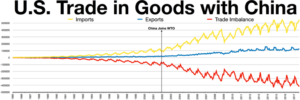
The major indicators did not falter the day after President Trump announced he was raising the threatened tariffs on China from 10% to 25% on $200 billion worth of products. The NASDAQ composite, the Dow Jones Industrial Average and the S&P 500 were all higher by a bit following the announcement.
The consensus among analysts is that US business will survive the latest signs of a coming trade war as well as they have previous similar threats from the president and from reactions from abroad.
In an interview Randy Frederick, vice president of trading and derivatives at Charles Schwab& Co. Inc said,
“The economy generally is so strong that, despite the challenges of the potential trade war, the strength of the economy is more than offsetting that. Corporations have posted record profits this quarter that we haven’t seen in over a decade.”
There have been warnings, however, from companies such as Coca Cola, General Motors, Caterpillar, Ford and Harley Davidson that the tariffs of 25% already imposed on steel and 10% on aluminum; and previous tariffs on $34 billion of Chinese goods, will have negative consequences on 2018 earnings, and further into the future. Retaliatory tariffs have already been imposed by China and US allies like the European Union, Mexico and Canada. There are also many smaller businesses that have suffered from the tariff policy.
Not everyone is suffering. Many companies have seen higher profits during Q2. Apple’s sales in China flew to 19 percent from March to June. Caesars Entertainment Corp showed an 89.3% increase in profits to $282 million. And even though Caterpillar predicted higher prices, the company’s net income rose 112% during Q2 to $1.7 billion.
These data points are not indicative of anything, since the tariffs will not be imposed until September at the earliest, and their effect will not be manifest until months later. US Business is still fearful of what tariffs will do to their bottom lines:
“We said before that this round of tariffs amounted to doubling down on the recklessness of imposing trade policy that will hurt U.S. families and workers more than they will hurt China. Increasing the size of the tariffs is merely increasing the harm that will be done,” National Retail Federation CEO Matthew Shay said in a statement. “Quite simply, there has been no better example of cutting off one’s nose in order to spite the face.”